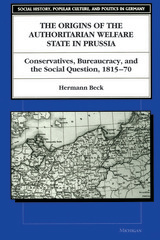
In Aesthetics, Industry, and Science M. Norton Wise answers these questions not simply from a technical perspective of theories and practices but with a broader cultural view of what was happening in Berlin at the time. He emphasizes in particular how rapid industrial development, military modernization, and the neoclassical aesthetics of contemporary art informed the ways in which these young men thought. Wise argues that aesthetic sensibility and material aspiration in this period were intimately linked, and he uses these two themes for a final reappraisal of Helmholtz’s early work. Anyone interested in modern German cultural history, or the history of nineteenth-century German science, will be drawn to this landmark book.

One of the livelier debates amongst historians concerns the dates of the beginning and, particularly, the end of Prussian history. Eminent historian Gordon A. Craig explores the slow death of Prussia by examining several key individuals and their actions at four distinct periods of Prussian history.
"Simply said, the book is a beautiful piece. Insightful and lucid. . . . The End of Prussia has the rare quality of being suitable for both the specialist and the more casual student of German history."—Wisconsin Academy Review

For German philosophers at the turn of the nineteenth century, beautiful works of art acted as beacons of freedom, instruments of progress that could model and stimulate the moral autonomy of their beholders. Amid the Revolutionary and Napoleonic wars, Germans struggled to uphold these ideals as they contended with the destruction of art collections, looting, and questions about cultural property. As artworks fell prey to the violence they were supposed to transcend, some began to wonder how art could deliver liberation if it could also quickly become a spoil of war. Alice Goff considers a variety of works—including forty porphyry columns from the tomb of Charlemagne, the Quadriga from the Brandenburg Gate in Berlin, the Laocoön group from Rome, a medieval bronze reliquary from Goslar, a Last Judgment from Danzig, and the mummified body of an official from the Rhenish hamlet of Sinzig—following the conflicts over the ownership, interpretation, conservation, and exhibition of German collections during the Napoleonic period and its aftermath.

In the aftermath of World War II, Prussia—a centuries-old state pivotal to Europe’s development—ceased to exist. In their eagerness to erase all traces of the Third Reich from the earth, the Allies believed that Prussia, the very embodiment of German militarism, had to be abolished. But as Christopher Clark reveals in this pioneering history, Prussia’s legacy is far more complex. Though now a fading memory in Europe’s heartland, the true story of Prussia offers a remarkable glimpse into the dynamic rise of modern Europe.
What we find is a kingdom that existed nearly half a millennium ago as a patchwork of territorial fragments, with neither significant resources nor a coherent culture. With its capital in Berlin, Prussia grew from being a small, poor, disregarded medieval state into one of the most vigorous and powerful nations in Europe. Iron Kingdom traces Prussia’s involvement in the continent’s foundational religious and political conflagrations: from the devastations of the Thirty Years War through centuries of political machinations to the dissolution of the Holy Roman Empire, from the enlightenment of Frederick the Great to the destructive conquests of Napoleon, and from the “iron and blood” policies of Bismarck to the creation of the German Empire in 1871, and all that implied for the tumultuous twentieth century.
By 1947, Prussia was deemed an intolerable threat to the safety of Europe; what is often forgotten, Clark argues, is that it had also been an exemplar of the European humanistic tradition, boasting a formidable government administration, an incorruptible civil service, and religious tolerance. Clark demonstrates how a state deemed the bane of twentieth-century Europe has played an incalculable role in Western civilization’s fortunes. Iron Kingdom is a definitive, gripping account of Prussia’s fascinating, influential, and critical role in modern times.

The Origins of the Authoritarian Welfare State in Prussia examines this Prussian/German identity. It investigates the complex traditions of ideas, institutions, and social policy measures that lay at the root of the conservative Prussian welfare state. The examination of the ideas and policies of Prussian officials brings out a peculiar welfare state mentality of benevolence and patriarchal concern, pervaded by authoritarian streaks, that was unique in nineteenth-century Europe. In addition, the study analyzes the historiographical implications of the question of continuity and discontinuity in German history.
The Origins of the Authoritarian Welfare State in Prussia is of interest to scholars and students of German history as well as to students of governmental social policy and of the workings of a welfare state.
Hermann Beck is Associate Professor of History, University of Miami.
READERS
Browse our collection.
PUBLISHERS
See BiblioVault's publisher services.
STUDENT SERVICES
Files for college accessibility offices.
UChicago Accessibility Resources
home | accessibility | search | about | contact us
BiblioVault ® 2001 - 2024
The University of Chicago Press









